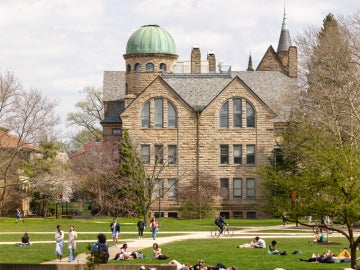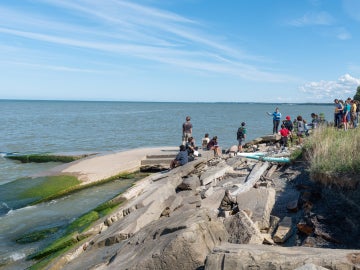Mental Health Research Assistant: Ify Ezimora ’19
May 15, 2020
Jaimie Yue '22

Ify Ezimora '19 is a clinical research assistant
Photo credit: Courtesy of Ify Ezimora
Ify Ezimora ’19 double majored in psychology and environmental studies. While she had a passion for psychology since high school, the environmental research she did with Professor of Psychology and Environmental Studies Cindy Frantz, Paul Sears Distinguished Professor of Environmental Studies and Biology John Petersen, and Associate Professor of Environmental Studies Rumi Shammin compelled her to double major in environmental studies.
With all the professional experience she gained at Oberlin from budget management to tutoring and community service, she now applies it to her current role as a clinical research assistant at Rhode Island Hospital, Hasbro Children’s Hospital, and the Miriam Hospital. There, she is directly engaged in studies about current physical and mental health issues plaguing society.
What does an average day look like for you?
On a typical day, I screen the medical records of all the patients who present to the emergency department and look at their past medical history and chief complaint to see if they meet the inclusion/exclusion criteria for any of our active studies. If they are eligible for any of our studies, I approach them, pitch the study to them to see if they’d be interested, and complete any enrollment procedures like quantitative and qualitative surveys and blood draws before they get discharged from the hospital. Currently, we are working on studies addressing the opioid epidemic, Lyme disease, gastroenteritis, adult and child trauma, active suicidal ideation, gout, and geriatric fall prevention. In addition, as the lead RA on a couple of our studies, I also monitor the regulatory binders and make sure that all of our paperwork is in line with the IRB requirements.
Why did you double major in psychology and environmental studies?
I took AP psychology during my junior year of high school and fell in love with it. Everything I learned in that class really resonated with me and just made sense, and I couldn’t imagine being in any other field. I came to Oberlin as an intended psychology major. I actually didn’t plan on majoring in environmental studies, but after participating in the STRONG program (Science and Technology Research Opportunities for a New Generation) and working on interdisciplinary psychology and environmental studies research with Cindy Frantz, John Petersen, and Rumi Shammin on Oberlin’s campus the summer before my first year, I completely fell in love with the environmental studies department and decided to double major in that.
Did any extracurricular activities or student jobs at Oberlin give you professional experience?
I feel like every job I ever had at Oberlin gave me professional skills that can be applied to the real world. Working as the assistant student treasurer in the Office of the Student Treasurer and then as cochair of the Student Finance committee—the bodies that oversee and allocate the roughly $1.4 million Student Activity Fund to different student organizations—I built skills in budget-balancing, employee management, public speaking, collaboration, and form processing. Tutoring for America Reads and the Ninde Scholar program as a Bonner Scholar, I learned the intricacies of working with youth and adolescents in an academic setting and how to tailor teaching approaches to the specific individual. And working as a resident assistant and then village assistant for ResEd, I built professionalism over email and phone communication and an ability to adhere to confidentiality and learned how to build community among groups of people. Every week I find myself remembering what I learned at Oberlin and applying it to my current job.
Did any professors or faculty at Oberlin particularly enhance your college experience?
So many faculty members—and just in general, so many people at Oberlin for that matter—really made my college experience one that I can never forget. However, the one faculty member that was the cornerstone of my undergraduate experience was Professor of Psychology and Environmental Studies Cindy Frantz. Cindy pushed me every step of the way through undergrad, and I definitely would not be the same person I am now if I had not met her. She was my academic advisor and research advisor and beyond that, a second mom for me. I was able to talk through difficult decisions with her, and she would give me advice and help me brainstorm whenever I needed it and was always there for me. Cindy taught all of her classes with so much compassion and care for social issues and individuals in the class. Additionally, because she serves as faculty for both the environmental studies program and a psychology department, she was able to be my academic advisor for both of my majors which allowed us to grow closer.
You may also like…
Oberlin Launches Critical AI Studies Minor in Fall 2026
With a solid foundation in both science and the humanities, this minor ensures students to understand and be able to analyze the ethical, cultural, environmental, political, economic, technological, and labor effects of AI.
Research Roundup
Every day, Oberlin’s faculty and students produce scholarly work that uncovers new insights into how we understand the world, particularly in the areas of sustainability and the environment.
Walter Moak ’25 Earns Fulbright to Germany
The record-setting Oberlin athlete and musical studies major has earned a Fulbright English Teaching Assistantship (ETA) to Germany for the 2025-2026 academic year.


